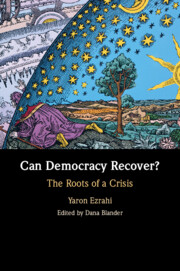Book contents
- Can Democracy Recover?
- Can Democracy Recover?
- Copyright page
- Dedication
- Contents
- Preface
- Words from the Author
- Introduction
- Part I The Rise of Western Politics following the Collapse of the Monistic Medieval Cosmology
- Part II The Emergence of the Epistemological Constitution of Modern Democracy
- Part III The Dialectics of Objectification
- Part IV The Erosion of the Epistemological Constitution of Modern Democracy
- Part V Democracy beyond Modernity
- 17 Early Modernizers of Politics
- 18 Modern Critics of Democracy
- Can Democracy Recover? Concluding Reflections
- Epilogue
- Index
17 - Early Modernizers of Politics
from Part V - Democracy beyond Modernity
Published online by Cambridge University Press: 02 January 2025
- Can Democracy Recover?
- Can Democracy Recover?
- Copyright page
- Dedication
- Contents
- Preface
- Words from the Author
- Introduction
- Part I The Rise of Western Politics following the Collapse of the Monistic Medieval Cosmology
- Part II The Emergence of the Epistemological Constitution of Modern Democracy
- Part III The Dialectics of Objectification
- Part IV The Erosion of the Epistemological Constitution of Modern Democracy
- Part V Democracy beyond Modernity
- 17 Early Modernizers of Politics
- 18 Modern Critics of Democracy
- Can Democracy Recover? Concluding Reflections
- Epilogue
- Index
Summary
In this chapter, Ezrahi analyzes the influence of philosophers like Hobbes, Spinoza, Locke, Vico, and Rousseau, as well as the Federalists, on the shift from a medieval monistic cosmology based on God to a modern dualistic cosmology, emphasizing dynamic Nature and human agency. These thinkers played a pivotal role in shaping a political order and obedience independent of divine authority, turning to Nature as the source of laws and a check on human actions. This transformation led to the emergence of new concepts, such as the state, freedom, and equality, despite their being imaginative. Hobbes pioneered the use of metaphors and empirical sciences in civic affairs. Spinoza adopted a detached scientific perspective, viewing human emotions and drives as natural phenomena. Locke presented empiricism and probability to inform political decisions through an understanding of human judgment. Vico proclaimed that political systems are based on collective political imagination, facilitating the construction of institutions and political processes rooted in commonsense. Rousseau further developed the dichotomy of Nature/Culture, highlighting its impact on politics, education, and ethics. The American Revolution marked the merging of objective Nature and human agency, giving rise to the idea of employing science to manipulate Nature.
- Type
- Chapter
- Information
- Can Democracy Recover?The Roots of a Crisis, pp. 165 - 179Publisher: Cambridge University PressPrint publication year: 2025

